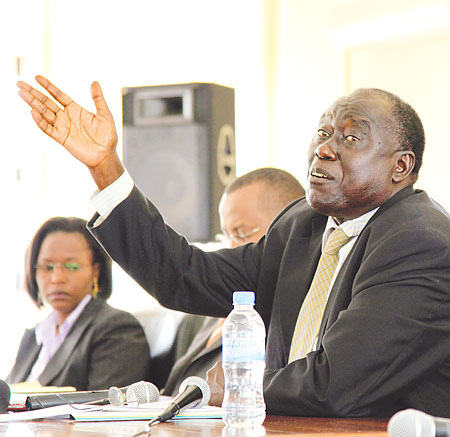Last week’s findings of a judicial inquiry commissioned by French judges, Marc Trévidic and Nathalie Poux, marks the end of an era and brings to close 17 years of lies, the Minister of Justice has said. Tharcisse Karugarama was yesterday addressing a news conference, in which he said that conclusions of the four-year investigation had exposed the country’s “detractors who have been distorting and misrepresenting facts”.


Last week’s findings of a judicial inquiry commissioned by French judges, Marc Trévidic and Nathalie Poux, marks the end of an era and brings to close 17 years of lies, the Minister of Justice has said.
Tharcisse Karugarama was yesterday addressing a news conference, in which he said that conclusions of the four-year investigation had exposed the country’s "detractors who have been distorting and misrepresenting facts”.
He dismissed claims that the report was not the end to the conflicting theories about the circumstances that surrounded the downing of the Falcon 50 jet that was carrying former President Juvenal Habyarimana.
"This is a case file that is finished as far as we can see,” he said.
The inquiry corroborated a 2010 Rwandan finding that the missiles that killed the former leader, his Burundian counterpart, Cyprien Ntaryamira, a French crew, among others, were launched from Kanombe military base, which was under the full control of Habyarimana’s elite units.
"To say that the plane was shot from Kanombe is not new. There is a UN report, the Mutsinzi Report, the Carlson Report, the report of eminent persons, the British Military Academy and investigations by the ICTR, which all pointed at Kanombe,” said Karugarama.
"But let’s say maybe it wasn’t shot from Kanombe, it doesn’t make any difference because Masaka was also under the control of forces of Juvenal Habyarimana. On April 6, 1994, RPF forces (then a rebel group) were far from this area,” Karugarama said.
At the time of the incident, RPF maintained 600 troops at the CND (now Parliamentary Buildings, Kimihurura) – about four kilometres from the airport – as part of a peace deal that had been signed between the RPF and the Habyarimana government.
Karugarama said the latest French report squashed the "wild allegations” by French judge Jean Louis Brugueire against RPF officers, which had resulted into 2006 highly controversial arrest warrants against nine Rwandan officials.
"It was ridiculous. A cowboy judge sitting in France decided to indict people without any investigations or setting foot on the ground. He hoodwinked witnesses and then issued arrest warrants which have inconvenienced since 2006!” he said.
"You block innocent people from travelling? You are a dangerous person to justice and under normal justice principles, his actions were criminal and he should have been arrested for that,” Karugarama said of Brugueire, now a retired judge.
He added that Brugueire had manipulated witnesses, including the late Abdoul Ruzibiza and Emmanuel Ruzigana, tricking them into signing affidavits, as direct witnesses, but were later to retract their testimonies.
Karugarama said that when Brugueire fell out with his country’s justice system, after his manipulations were discovered, the two judges who took over the case interviewed the same witnesses, only for the latter to confess that they had been manipulated.
Ruzibiza told the judges that all he wanted was a visa to Europe and that, once they agreed to facilitate him, he cooperated, not knowing that they would manipulate him, Karugarama said.
Later, when Ruzibiza was facilitated to settle in Norway, he withdrew his statements, the minister explained.
"Some people are saying the report is not conclusive, there is something else remaining; no, there is nothing, that’s hogwash”.
"First, the (latest) report states that the witnesses in Bruguiere’s case retracted their testimonies saying it was total manipulation by the French Secret Service. Secondly, the experts with expertise in acoustics and ballistics came here,” he pointed out.
Karugarama said that the question of Masaka is ‘completely excluded’ as a result of a cumulative investigation conducted by experts.
What next?
Karugarama said it will be up to the two judges, who commissioned the latest investigation, to decide on the way forward.
He said that based on the findings of the shooting and what followed after, including the mysterious disappearance of the Black Box and communication systems, it is clear that there was no evidence linking RPF to the shooting.
"If there was any slightest evidence linking RPF to the shooting obtained from the Black Box, by now it would have been used,” Karugarama said.
On Bagosora et al….
Karugarama also spoke about the decision by the International Criminal Tribunal of Rwanda (ICTR) Appeals Chamber to reduce the sentence of Theoneste Bagosora, the renowned architect of the Genocide, from life to 35 years.
"The decision of the Appeals Chamber on Bagosora will live to haunt that tribunal, forever, and the individual who made that decision. It was the most disastrous decision any international tribunal could ever make,” Karugarama said.
He noted that the decision to reduce the sentence of a man who publicly declared the ‘apocalypse’, was a betrayal to Rwandans and justice, in general, adding that the blood of the victims of the Genocide would live to haunt those behind it.
Karugarama also spoke about the decision by the same court to send Jean Uwinkindi to Rwanda to face trial as a positive development, noting that the referral, expected this week, was a demonstration of the transformation the country’s justice system has undergone.
"Justice structures, the judiciary and all the components have fitted together so well that, today, we can say justice in Rwanda has come of age.”
He also pointed to similar decisions by Sweden, Norway, Denmark and the European Court of Justice.


